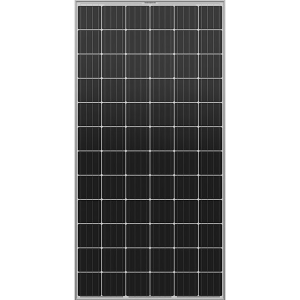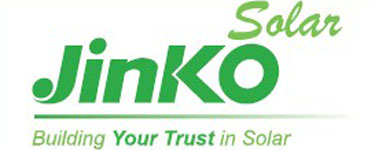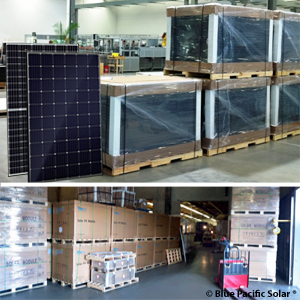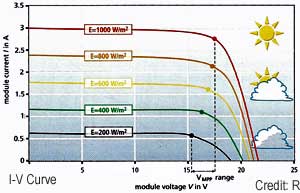The Best Solar Panels for 2024
Why More Watts in a Solar Panel Often Means Larger Surface Area
While a larger surface area on a solar panel usually translates to higher wattage, it's not a perfect one-to-one relationship. Let's explore the reasons why:
More Sunlight Capture
- Solar panels convert sunlight into electricity using photovoltaic cells.
- A larger surface area means more space for these cells.
- More cells can capture more sunlight, potentially producing more electricity, leading to higher wattage.
Efficiency Matters Too
Panel efficiency, the percentage of incoming sunlight converted into electricity, is crucial. A highly efficient panel can generate more watts per square foot than a less efficient one, even if it's smaller.
Other Factors
- Technology: Different solar cell technologies have varying efficiencies.
- Sunlight Availability: The amount of sunlight a panel receives impacts its output.
- Temperature: Solar panels generate less electricity as they get hotter.
Conclusion
- More surface area generally allows for more photovoltaic cells, leading to higher wattage.
- Panel efficiency, sunlight availability, and temperature also play significant roles.
- Evaluating a solar panel based solely on its size can be misleading. Consider its wattage rating, efficiency, and other factors for a more accurate assessment.
High Quality Tier One Solar Panels
Solar Panel Information - Click on the Tabs above to learn more about solar energy


Jinko 415 Watt Solar Panel


HANWHA 410 Watt Q CELLS Q.PEAK ML-G10+ BLACK ON BLACK 132 HALF-CELL PANEL


Mission 385 Watt Solar Panal


Q-Cells 480 Watt Solar Panel
Jinko - Mission - Panasonic -Q-Cell - Canadian - Solaria - Solar Panels


Q-Cells 365 Watt Solar Panel


Canadian Solar
390 Watt Panels


Panasonic
Solar Panels


Trina
415 Watt Panel
Jinko - Mission - Panasonic -Q-Cell - Canadian - Solaria - Solar Panels
Company Offers Home Systems - Pre-Engineered DIY Thin Film Solar Panels Kits & Systems - On-Grid or Off Grid - Hybrid - Wind
DIY Solar Electricity Packages & Kits
Solar Efficiency Solar Panels
DIY Solar Panel Installation Instructions Facts
Certainly! Here are some general facts and considerations regarding DIY solar panel installation:
- Safety first: Prioritize safety throughout the installation process. Use appropriate safety gear, such as gloves, goggles, and a hard hat. Be cautious when working at heights or handling electrical components.
- Research and planning: Thoroughly research and educate yourself about solar panel installation. Understand the basics of photovoltaic systems, electrical wiring, and local regulations. Plan the layout and design of your solar system accordingly.
- Permits and regulations: Check with your local authorities regarding permits, codes, and regulations for solar panel installations. Ensure compliance with building codes, fire safety requirements, and electrical standards.
- Equipment selection: Choose high-quality solar panels, inverters, and mounting equipment from reputable manufacturers. Consider factors such as efficiency, warranties, compatibility, and suitability for your specific needs.
- Site assessment: Evaluate your site's solar potential by considering factors such as sunlight exposure, shading, and roof orientation. Ensure that your roof is structurally sound and capable of supporting the added weight of the solar panels.
- Electrical considerations: Understand the electrical requirements and connections involved in a solar panel system. Learn about AC and DC wiring, grounding, and electrical panel interconnection.
- Mounting and installation: Follow the manufacturer's instructions carefully for installing the mounting racks or rails. Ensure proper attachment to the roof and use appropriate flashing and sealing techniques to prevent leaks.
- Panel installation: Securely mount the solar panels onto the installed racks, following the manufacturer's instructions. Connect the panels together using the provided connectors or cables.
- Inverter installation: Install the solar inverter in a suitable location near your main electrical panel. Follow the manufacturer's instructions for mounting and electrical connections. Ensure proper grounding and compliance with safety standards.
- Wiring and connections: Run the appropriate wiring from the solar panels to the inverter, following best practices for cable management and protection. Connect the inverter to your main electrical panel, adhering to local electrical codes.
- System testing and commissioning: After the installation, carefully test the system to ensure proper functionality and safety. Check for correct wiring, grounding, and system performance. Monitor the system's output to verify its efficiency.
Remember, these are general considerations, and it's crucial to consult specific installation instructions provided by the manufacturer of the solar panels and equipment you are using. Additionally, consulting with a professional or licensed installer can provide valuable guidance and ensure a safe and successful DIY solar panel installation.
Solar Features and Benefits
- DYI Efficiency Solar Panels
- Type of Solar Panels
- Net Metering Panel Kit
- Federal Solar Tax Credits
- Solar Battery Systems
- Clean Energy
- Solar Panel Systems
- Buy Solar Panels
- Solar Engergy Panels
- Commercial Systems
- Solar Panels Work
- Determine the Most Efficient Solar Panel on the Market
- Powerpack Solar Panel Cost
- Home Kits, Off-grid Systems
- Product Warranty Covers
- Utility Panel Rebates
- Best Solar Panels
- Long Term Solar Panels

